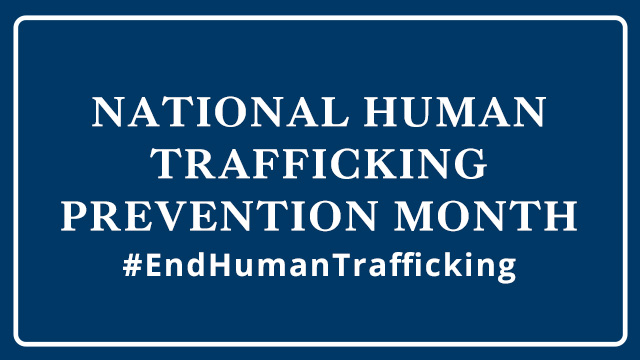National Human Trafficking Prevention Month – U.S. Embassy in Georgia
National Human Trafficking Prevention Month 2023

January is National Human Trafficking Prevention Month. Every year since 2010, the President has dedicated the month to raise awareness about human trafficking and to educate the public about how to identify and prevent this crime. The U.S. Department of State raises awareness of human trafficking domestically and abroad, through U.S. embassies and consulates.
During this month, we celebrate the efforts of foreign governments, international organizations, anti-trafficking entities, law enforcement officials, survivor advocates, communities of faith, businesses, and private citizens all around the world to raise awareness about human trafficking.
The History Behind the Month
More than 20 years ago, the Trafficking Victims Protection Act (TVPA) of 2000 enshrined the United States' commitment to combating human trafficking domestically and internationally. In 2010, by presidential proclamation, President Obama declared January “National Slavery and Human Trafficking Prevention Month” and every year since, each president has followed this tradition.
President Biden has proclaimed January 2023 as “National Human Trafficking Prevention Month,” reaffirming his Administration's commitment to protect and empower survivors of all forms of human trafficking, to prosecute traffickers, and to bring an end to human trafficking in the United States and around the world. “Since human trafficking disproportionately impacts racial and ethnic minorities, women and girls, LGBTQI+ individuals, vulnerable migrants, and other historically marginalized and underserved communities, our mission to combat human trafficking must always be connected to our broader efforts to advance equity and justice across our society.”
Presidential proclamations not only raise the profile of the issue, but are also snapshots of global trends and challenges, and significant U.S. anti-trafficking policy achievements. Some highlights include:
Human Trafficking
Human trafficking, also known as trafficking in persons, includes both forced labor and sex trafficking. It not only represents a threat to international peace and security but also undermines the rule of law, robs millions of their dignity and freedom, enriches transnational criminals and terrorists, and threatens public safety and national security everywhere.
There are estimated to be more than 27.6 million people — adults and children — subjected to human trafficking around the world, including in the United States. Traffickers often take advantage of instability caused by natural disasters, conflict, or a pandemic to exploit others. During the COVID-19 pandemic, traffickers are continuing to perpetrate the crime, finding ways to innovate and capitalize on the chaos.
Like the United States, many countries around the world have worked to implement the “3P” paradigm of preventing the crime, protecting victims, and prosecuting traffickers, through the passage and implementation of national anti-trafficking laws. Today, there are 178 parties to the UN Protocol to Prevent, Suppress and Punish Trafficking in Persons. Only 14 of the 188 countries and territories assessed in the Department of State's 2021 Trafficking in Persons Report have yet to adhere to this international standard to ensure their laws criminalize all forms of human trafficking, and take concerted steps to prevent human trafficking, protect all victims, and cooperate internationally to combat this global crime.
Despite the nearly worldwide adoption of international and domestic norms to address and prevent human trafficking, we continue to witness traffickers exploit people in the United States and around the world. But everyone has the power to help make a difference. Every Presidential proclamation for January ends with a call to action for all Americans to recognize the vital role everyone can play in combating all forms of human trafficking.
This “Eyes on Trafficking” story is reprinted from its original online location.
 ABOUT PBJ LEARNING
ABOUT PBJ LEARNING
PBJ Learning is a leading provider of online human trafficking training, focusing on awareness and prevention education. Their interactive Human Trafficking Essentials online course is used worldwide to educate professionals and individuals how to recognize human trafficking and how to respond to potential victims. Learn on any web browser (even your mobile phone) at any time.
More stories like this can be found in your PBJ Learning Knowledge Vault.
EYES ON TRAFFICKING
This “Eyes on Trafficking” story is reprinted from its original online location.
ABOUT PBJ LEARNING
PBJ Learning is a leading provider of online human trafficking training, focusing on awareness and prevention education. Their interactive Human Trafficking Essentials online course is used worldwide to educate professionals and individuals how to recognize human trafficking and how to respond to potential victims. Learn on any web browser (even your mobile phone) at any time.
More stories like this can be found in your PBJ Learning Knowledge Vault.
